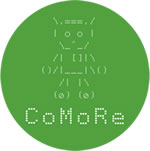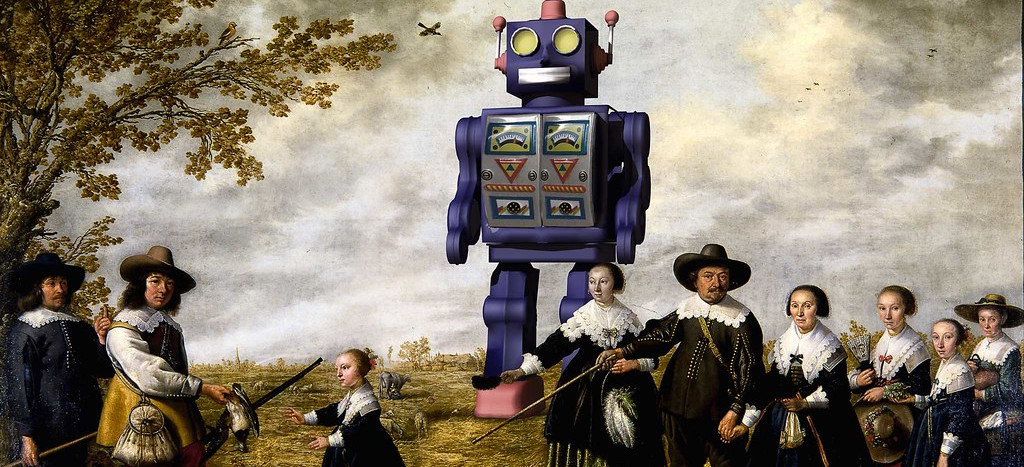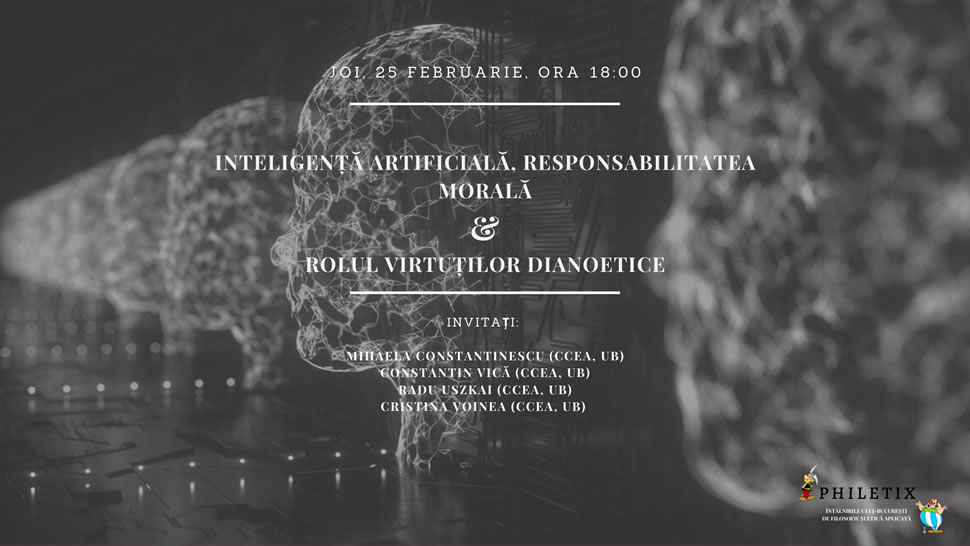- CoMoRe won the annual prize for the best paper in the humanities from the University of Bucharest for “Understanding responsibility in Responsible AI. Dianoetic virtues and the hard problem of context“

- EthicAI=FORUM. How Can AI Be Right?, Goethe Institut Athens, 24 November 2022

Mihaela Constantinescu took part in the cross-disciplinary panel discussion revolving around the question How can AI be right?
- Summer School AI & Ethics, Goethe Institut & University of Bamberg, Germany, 26-30 September 2022

During her keynote lecture entitled Where Is Responsibility in Responsible AI?, Mihaela Constantinescu talked about the ethical dimension of responsibility in Responsible AI. In discussing the implications of Aristotelian virtue ethics to tackle Responsible AI, she emphasized the role played by notions of context and dianoetic virtues in grounding the concept of moral responsibility.
- Themes from Raimo Tuomela’s Social Ontology, ICUB, University of Bucharest, 27-28 September 2022

As part of the panel dedicated to The Morality of Group Agents, Mihaela Constantinescu talked about “Organizational agents, methodological collectivism, and moral responsibility”. Her talk defended an agential view of corporate moral responsibility, whereby group agents such as organizations may be adequately ascribed collective moral responsibility.

The 2nd edition of the Responsibility Matters Workshop Series (RMWS) explores the topic of “Responsible Robotics” at the crossroads between agency, virtues and art, with respect to moral, social and environmental stakes in an era in which robotic AI systems are beginning to permeate our day-to-day lives, from the job market and transportation, to education, artistic production, accessibility, surveillance and beauty, to name a few.
The deployment of such technologies raises various ethical concerns, especially when robots equipped with machine learning systems may display a high degree of autonomy so that they exhibit (moral) agency, which further raises concerns regarding responsibility attributions for decision-making, but also for authorship and creativity. Relatedly, robotic autonomy and agency raises concerns over human interaction, e.g, the adequacy of displaying virtuous behaviours towards machines. Such concerns generate normative implications for the way robots should be designed, developed, regulated and used.
“Responsible Robotics: agency, virtues, and art” workshop addresses these concerns from mixed perspectives of ethics, art, philosophy of technology, and epistemology, revolving around questions such as: How much autonomy and agency can/should robots really display? How can virtue ethics inform the field of Responsible Robotics? What are the ethical concerns raised by the prospect of robot artists? What role can epistemology play in Responsible Robotics? How may technologies become probes to explore the great outdoors in an all-inclusive — yet responsible — fashion?
- Robophilosophy Conference 2022 – Social Robots in Social Institutions, August 16-19, 2022, With Mihaela Constantinescu, Constantin Vică & Radu Uszkai

On August 16, Mihaela Constantinescu, Constantin Vică & Radu Uszkai deliverd a talk entitled Robo-Education and the Pedagogical Divide. On the background of recent concerns regarding online education in times of pandemic and a growing pedagogical
divide in terms of unequal access to skilled teachers, they considered it timely to open a
debate surrounding the use of social robots in education fulfilling a role that is anchored in
the institution of pedagogs in Antiquity and which was somewhat left aside from contemporary inquiries: the pedagogical role of supporting and complementing the
teaching activity. They developed their conceptual philosophical contribution to this debate around the following question: Is the use of social robots in primary and lower secondary education an intervention that can contribute positively to bridging the pedagogical divide? They offered a moderate-positive answer to this question within the normative framework of Aristotelian virtue ethics. Namely, they argued that social robots in the form of collaborative robots (cobots) can be co-designed as pedagogical enabling devices to provide support to children for acquiring intellectual virtues necessary in the educational process and thus contribute to solving part of the pedagogical divide.
- 2022 Bucharest-Oxford Workshop in Practical Ethics – 18 July 2022, hosted by The Oxford Uehiro Centre for Practical Ethics
Mihaela Constantinescu gave a talk entitled ”On the (im)possibility of robots acting virtuous” (together with Oxford professor Roger Crisp, highlighting that the requirements of Aristotelian virtue ethics make it impossible for robots to act virtuous. To show that AI systems cannot genuinely be virtuous but can only behave in a virtuous way, the two speakers delineated the philosophical understanding of the nature of virtue in the Aristotelian virtue ethics tradition, which they take to imply the ability to perform (1) the right actions (2) with the right feelings and (3) in the right way. They discussed each of the three requirements and concluded that AI is unable to satisfy any of them.
- EthicAI=LABS, April-November 2022, Goethe Institutes in Southeastern Europe
- Philosophy of Human-Technology relations, Aalborg University, Copenhagen, Denmark, July 07, 2022, With Cristina Voinea and Lavinia Marin
Recent advances in social epistemology have highlighted the role of epistemic cultures in
fostering collective intellectual virtues . Following this insight, Cristina and Lavinia argued that it is not sufficient for an epistemic agent to have the disposition to behave virtuously, one also needs to be embedded in a culture that favours virtuous behaviours by having an infrastructure of institutions that enforce social norms related to knowledge and inquiry. In their talk, they highlighted an overlooked aspect in the interaction between individuals and culture: the technical scaffolding of institutions.
- The 5 th International Conference on Economics and Social Sciences, June 17, 2022, With Radu Uszkai

Radu Uszkai delivered a presentation entitled The Catch-22 of Artificial Intelligence
regulation. The talk focused on the difficulties and intricacies of drafting and enacting ethical regulations for AI by both private and public organizations.
- Budapest Workshop on Philosophy of Technology 2021, December 9-10, 2021. With Radu Uszkai, Constantin Vica, Cristina Voinea

Radu Uszkai gave a talk entitled “Revenge of the droids: Star Wars, civil disobedience and the moral status of artificial agents” at the BudPT2021 conference organized by the Budapest University of Technology in Budapest. His presentation focused on an analysis of how the theme of the moral status of non-human artificial beings appears in several famous productions in the area of science fiction and fantasy movies and TV series, with a case study on the famous Star Wars series.
Cristina Voinea and Constantin Vică gave a talk on “Turing’s children lack of moral motivation” at the BudPT2021 conference organized by the Budapest University of Technology in Budapest. Starting from the situation of the android in the novel Machines Like Me, by Ian McEwan, Voinea and Vică analyze the importance of moral motivation, from a humean perspective, in the configuration of action and moral character.
- Responsibility Matters Workshop Series: AI & Moral Responsibility – October 21, 2021, 16.00-20.00hrs EET (Bucharest time)
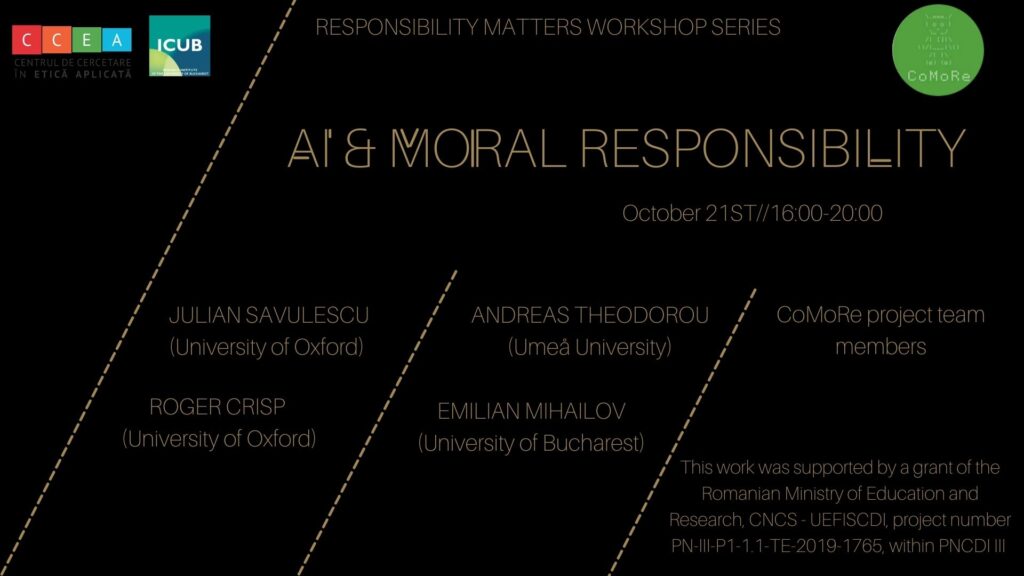
The CoMoRe team organized the debut edition of the Responsibility Matters Workshop Series, entitled AI & Moral Responsibility, with the participation of keynote speakers prof. Roger Crisp and prof. Julian Savulescu, and guest speakers Andreas Theodorou and Emilian Mihailov. In their talks, members of the CoMoRe team (Cristina Voinea, Radu Uszkai, Constantin Vică, Mihaela Constantinescu) addressed questions such as: Who is morally responsible for the decisions taken by highly autonomous AI systems on the roads, in military conflicts, medical settings or even in our homes?
- UNESCO Days at the Polytechnic University of Bucharest, October 7 2021, 14:00 – 16:00h .
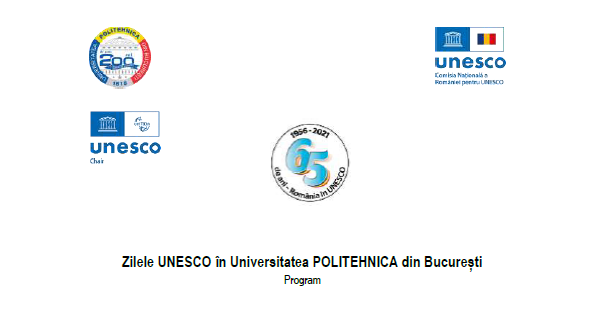
During the round table with the topic ”Ethics in Artificial Intelligence”, part of the UNESCO Days at the Polytechnic University of Bucharest, Mihaela Constantinescu spoke about the role of Aristotelian virtue ethics in conceptualizing the ethical aspects of AI responsible development. The presentation entitled “Artificial Intelligence, moral responsibility & Aristotelian virtue ethics” also discussed issues related to philosophical versus technical terminology regarding the meaning of autonomy in AI systems, as well as the way autonomy is constitutive for assigning moral responsibility for the deployment of AI.
http://www.unesco.chair.upb.ro/zilele-unesco/
- EthicAI=LABS | Bias Workshop, September 2 2021, Goethe Institut Sofia. With Mihaela Constantinescu
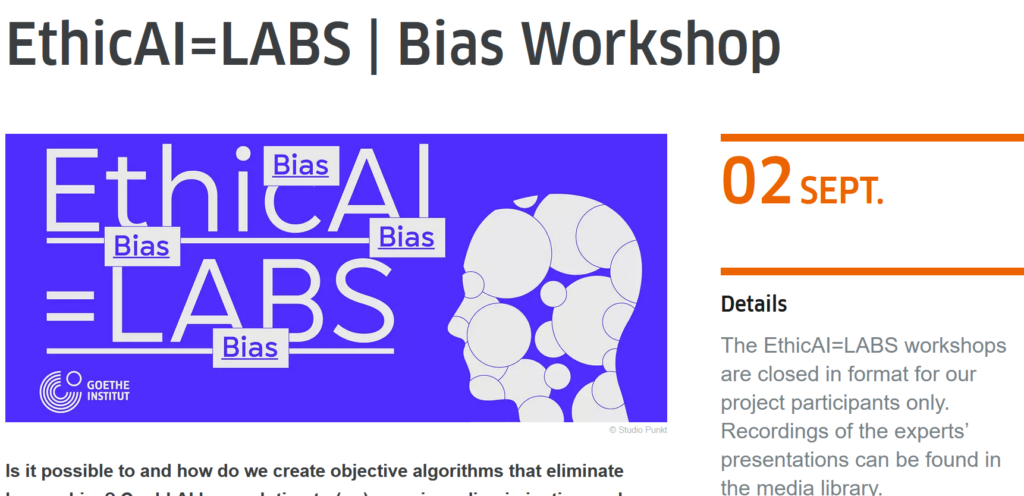
Is it possible to and how do we create objective algorithms that eliminate human bias? Could AI be a solution to (un)conscious discrimination or does it have the potential to deepen the problem? These are some of the questions addressed by Mihaela Constantinescu, in her talk entitled „AI, bias & moral responsibility”, delivered at the EthicAI=LABS | Bias Workshop at the invitation of Goethe Institut (Sofia), where she offered an answer grounded in Aristotelian virtue ethics.
https://www.goethe.de/prj/eai/en/eve.cfm?event_id=22362214
- CEPE/IACAP Joint Conference 2021: The Philosophy and Ethics of Artificial Intelligence – 8 July, 2021
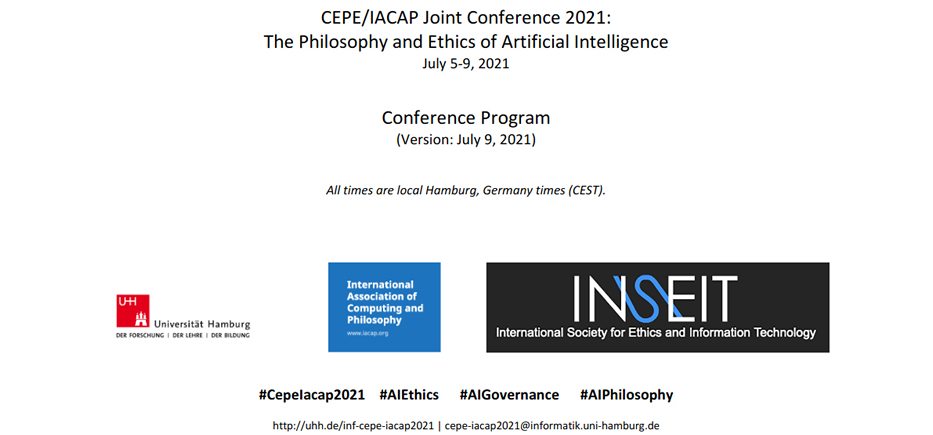
Cristina Voinea and Constantin Vică (together with their colleague Alexandru Dragomir) gave a talk entitled On medical technological paternalism. In it, they argued that although current medical AI systems increase effectiveness in diagnostic and treatment, thus enhancing the doctor’s capacities, they have the potential to reintroduce paternalism in the therapeutic relationship (emphasis on the trade-off between explainability and performance in DL and DNN more specifically). This is due to the fact that current medical AI systems are generally characterized by opacity, unintelligibility and lack of explainability.
XI Braga Meetings on Ethics and Political Philosophy – June 9, 2021
Radu Uszkai delivered a presentation entitled The case for a Basic Universal Genetic Endowment. While the main focus of his presentation revolved around questions of justice posed by enhancement technologies like CRISPR, Radu’s talk also tackled the issue of moral responsibility (in both individual and collective settings).
A recorder version of his presentation is available here
- Romanian National Commission for UNESCO – Online Colloquium: Ethics of Artificial Intelligence: How intelligently can we use AI? June 3, 2021, 11.00-14.00hrs.

Mihaela Constantinescu and Constantin Vică were two of the speakers at the academic roundtable organized by the Romanian National Commission for UNESCO aimed at exploring some of the ethical implications of using AI. While Mihaela’s talk focused on the moral externalities of AI, Constantin gave a presentation on the moral diplomacies and bureaucracies at play in the field of AI ethics.
- UNESCO Intergovernmental Meeting related to the draft Recommendation on the Ethics of Artificial Intelligence – April 26-30, 2021; June 21-25, 2021
Constantin Vică represented Romania in the processes of examining the draft text of the Recommendation on the Ethics of Artificial Intelligence (AI).
The recording of the first meeting is available here
- Social BRIDGES 3: The near-future of AI: How will humans and AI interact in 5 years? – April 23, 2021
Radu Uszkai and Anda Zahiu gave a talk on April 23 2021 at the Social BRIDGES 3 conference organized by Bundeswehr University Munich. The talk, titled You’ll never work alone: AI, robots, and the future of meaningful coaching in football, revolved around the use of AI in contemporary football coaching and its potential impact in the future. Radu and Anda argued that it is at least implausible that robots equipped with AI could leave human coaches without a job in the near future (due to a wide variety of reasons, chiefly among them being their lack of moral agency) but also that new advancements in technology should receive an integrationist treatment from both employees and employers, as they could assist and augment human capacities, rather than undercut their relevance in areas of human activity such as professional sports.
A recorded version of their presentation is available here
- CoMoRe @ CCEA weekly debates – February 25, 2021, 18.00-19.30, online. AI, moral responsibility and dianoetic virtues. With Mihaela Constantinescu, Constantin Vică, Cristina Voinea & Radu Uszkai
Hosted online by the Research Center in Applied Ethics (CCEA), Mihaela Constantinescu, Constantin Vică, Cristina Voinea & Radu Uszkai gave a talk entitled AI, moral responsibility and dianoetic virtues on February 25 2021 during the center’s weekly debates. The members of the team presented their draft paper on AI and moral responsibility in which they focused on the pivotal role played by dianoetic virtues.
More details regarding the event are available here.
- Embedding AI in Society: The 2021 Rabb Symposium at North Carolina State University – February 19, 2021
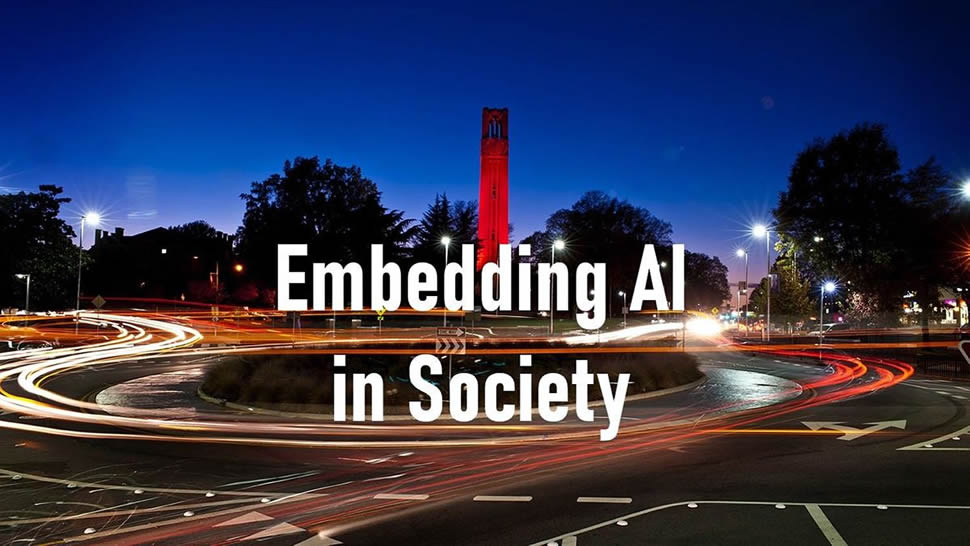
Cristina Voinea and Constantin Vică (together with their colleague Alexandru Dragomir) presented a paper entitled Luke, I’m NOT your Father: Beyond Technological Paternalism, Towards Mutual Cooperation Between Patients, Medical Staff and AI. In it, they argue that medial AI systems should be designed with an eye on how they alter therapeutic relationships. More specifically, medical AI should be designed so as to foster patient-centered therapeutic relationships, which have been proven to increase adherence to treatment, autonomy of both doctors and patients as well as trust between them and decrease the general discomfort of medical services and treatments.
- CoMoRe kick-off meeting – January 11, 2021, 18.00-20.00h, online. With Mihaela Constantinescu, Constantin Vică, Radu Uszkai, Cristina Voinea

The kick-off meeting of the CoMoRe project took place online, on January 11, 2021. Together with other scholars working on similar topics, the members of the project discussed the main hypotheses of their research, focusing on the moral status of AI and the problem of moral responsibility. With the feedback provided by other participants, the members of the project developed the conceptual framework for an article on responsible AI.
News
Contact
Research Center in Applied Ethics
Faculty of Philosophy, University of Bucharest
Splaiul Independenţei, No. 204,
Bucharest, 060024, Romania
